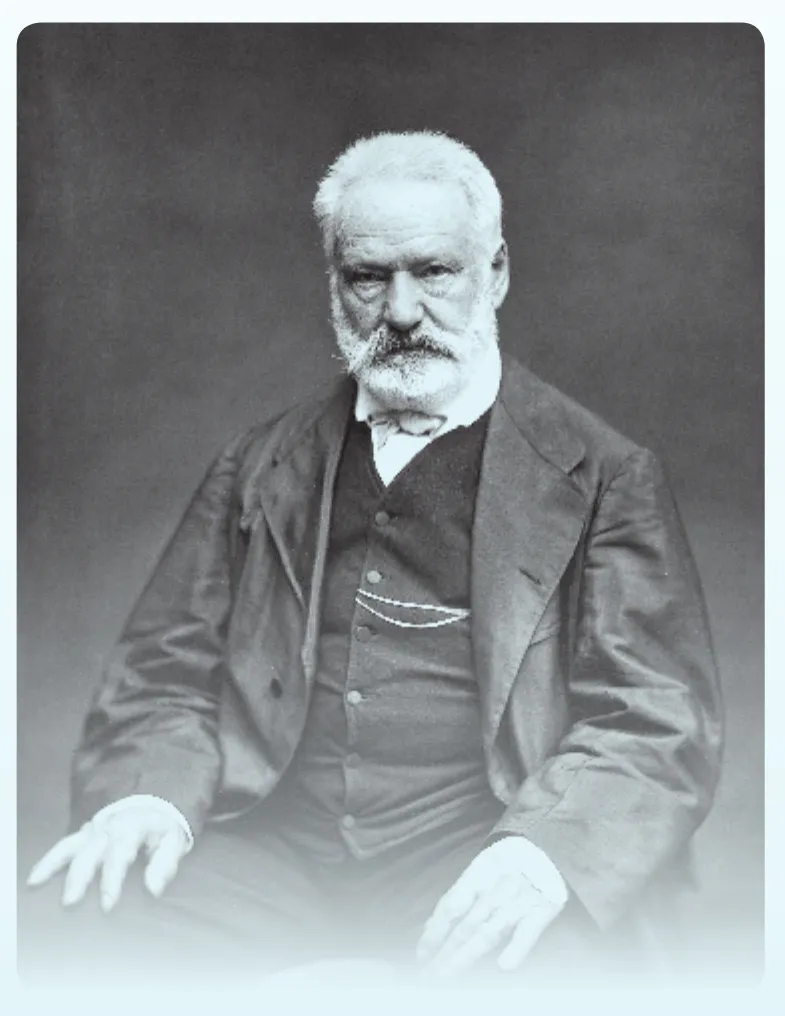LES MISÉRABLES
2017-04-10ByVictorHugo
⊙ By Victor Hugo
翻译:李丹、方于
LES MISÉRABLES
悲惨世界
⊙ By Victor Hugo
翻译:李丹、方于
法国大文豪维克多·雨果(1802—1885)是举世公认的19世纪浪漫主义文学领袖,以一部《巴黎圣母院》奠定了他在法国文学史上的大师地位;不过,雨果在60岁那年出版的《悲惨世界》,可不能简单地归类为浪漫主义作品——正是从这部小说开始,亲身经历过法国大革命以来各种风云变幻的雨果,心境早已与以前大不相同,在创作上逐渐表现出更为强烈的现实主义风格。
《悲惨世界》的灵感来源于一件发生在1801年的真人真事:一个穷苦农民因为饥饿而偷了一块面包,结果被判五年劳役,出狱后的生活处处碰壁。雨果由此决定写一个弃恶从善的故事,这就是一部鸿篇巨制的开始。为了创作这部小说,雨果多年来收集各种相关资料,结合自己的见闻感受,酝酿了二十年,搁置了十二年,最后在其政治流亡期间完成此书。可以说,无论是主人公冉阿让的磨难挣扎、女工芳汀的悲惨遭遇,还是马吕斯的革命热情、珂赛特的纯真善良,在小说中出场的每一个人物都有其现实原型。在轰隆的革命炮火中,政治浪潮此起彼伏,社会在磨难中走向正途……即便是生活在今天的我们,依然能够从书中真切感受到19世纪前期的法国风貌。
本期节选出自这部小说的第一个英文译本(Charles E. Wilbour版),整个故事要从冉阿让的恩人——米里哀先生说起……

In 1815,1)M.Charles Franois-Bienvenu Myriel was2)BishopofD——注. He was a man of seventy-five, and had occupied the bishopric of D—— since 1806.
Although it in no manner concerns, even in the remotest degree, what we have to relate, it may not be useless, were it only for the sake of exactness in all things, to notice here the reports and gossip which had arisen on his account from the time of his arrival in the3)diocese.
Be it true or false, what is said about men often has as much influence upon their lives, and especially upon their4)destinies, as what they do.
In 1804, M. Myriel was5)curéof B——(Brignolles). He was then an old man, and lived in the deepest6)seclusion.
Near the time of the7)coronation, a8)triflingmatter of business belonging to his curacy—what it was is not now known9)precisely—took him to Paris.
Among other10)personagesof authority he went to11)CardinalFesch on behalf of his12)parishioners.
One day, when the emperor had come to visit his uncle, the worthy curé, who was waiting in the13)ante-room, happened to be on the way of His14)Majesty. Napoleon noticing that the old man looked at him with a certain curiousness, turned around and said15)brusquely:
“Who is this goodman who looks at me?”
“16)Sire,” said M. Myriel, “you17)beholda good man, and I a great man. Each of us may profit by it.”

1) M. 法语Monsieur(先生)的缩写
2) bishop [΄bɪʃəp] n. 主教,下文的bishopric(主教辖区)为相关词。
3) diocese [΄daɪəsiːs] n. 主教管区
4) destiny [΄destɪnɪ] n. 命运,天命,定数
5) curé [kjʊə΄reɪ] n. 〈法〉本堂神甫,堂区牧师,下文的curacy(堂区牧师职务)为相关词。
6) seclusion [sɪ΄kluːʃ(ə)n] n. 隐居
7) coronation [ˌkɒrə΄neɪʃ(ə)n] n. 加冕,加冕礼
8) trifing [΄traɪflɪŋ] adj. 无关紧要的,微不足道的
9) precisely [prɪ΄saɪslɪ] adv. 准确地,明确地
10) personage [΄pзːsənɪdʒ] n. 名流,显贵,要人
11) cardinal [΄kɑːdɪn(ə)l] n. 红衣主教,枢机主教
12) parishioner [pə΄rɪʃənə(r)] n. 教区居民
13) ante-room [΄æntɪrʊm] n. (连接正厅的)前厅,候见室
14) majesty [΄mædʒɪstɪ] n. 陛下(需大写,前面与His、Her或Your连用)
15) brusquely [΄brʊsklɪ] adv. 唐突地,突然地
16) sire [΄saɪə(r)] n. 陛下,阁下
17) behold [bɪ΄həʊld] v. 目睹,看见
注: 此处指Digne,即今天的迪涅莱班(Digne-les-Bains),是一个位于法国南部的重要城市。


That evening the emperor asked the cardinal the name of the curé and some time afterwards M. Myriel was18)overwhelmedwith surprise on learning that he had been appointed Bishop of D——.
Beyond this, no one knew how much truth there was in the stories which passed current concerning the first19)portionof M. Myriel’s life. But few families had known the Myriels before the revolution.
M. Myriel had to20)submit tothe fate of every newcomer in a small town, where there are many tongues to talk, and but few heads to think. He had to submit, although he was bishop, and because he was bishop. But after all, the gossip with which his name was connected was only gossip: noise, talk, words, less than words—palabres, as they say in the21)forciblelanguage of the South.
Be that as it may, after nine years of22)episcopacy, and of23)residencein D——, all these stories, topics of talk, which24)engrossat first25)pettytowns and petty people, were entirely forgotten. Nobody would have26)daredto speak of or even to remember them.
18) overwhelm [ˌəʊvə΄welm] v. 使不知所措
19) portion [΄pɔːʃ(ə)n] n. 部分,一份
20) submit to (使)接受,(使)受到,(使)忍受
21) forcible [΄fɔːsəb(ə)l] adj. 强有力的,强暴的
22) episcopacy [ɪ΄pɪskəpəsɪ] n. 主教制度,主教职位
23) residence [΄rezɪdəns] n. 居住
24) engross [ɪn΄ɡrəʊs] v. 吸引(注意)
25) petty [΄petɪ] adj. 小的,偏狭的,地位低下的
26) dare [deə] v. 敢,竟敢,胆敢

You behold a good man, and I a great man.
主教的这句巧妙答话只有十个单词,看上去非常简单,却包含了三个值得大家仔细品读的亮点:①针对拿破仑的突然发问,主教将对方问话中的goodman(先生,古语用法)“曲解”成good man(好人),从而引出great man(伟人),成了一句非常得体的奉承话;②在结构相同的并列句中,后一分句可以省略与前一分句重复的内容,此处I a great man省略了谓语动词behold;③我们在日常生活中要表达“看”,一般根据具体意思采用look或者see,其实behold也有“看”的意思——它是一个比较正式的书面语,比look或者see的语气更为庄重。

一八一五年,迪涅的主教是查理·佛朗沙·卞福汝·米里哀先生。他是个七十五岁左右的老人;从一八〇六年起,他已就任迪涅区主教的职位。
虽然这些小事绝不触及我们将要叙述的故事的本题,但为了全面精确起见,在此提一提在他就任之初,人们所传播的有关他的一些风闻与传说也并不是无用的。
大众关于某些人的传说,无论是真是假,在这些人的生活中——尤其是在他们的命运中所占的地位,往往和他们亲身所做的事是同等重要的。
一八〇四年,米里哀先生是白里尼奥尔的本堂神甫。他当时已经老了,过着深居简出的生活。
在拿破仑即将加冕时,米里哀先生为了本教区的一件不知道什么小事,到巴黎去过一趟。
他代表其教区信众向上级有所陈请,夹在一群显要人物中去见费什红衣主教。
一天,皇帝来看他的费什舅父,这位尊贵的本堂神甫正在前厅候见,皇帝恰巧走过。拿破仑看见这位老人用一双好奇的眼睛瞧着他,便转过身来,突然问道:
“瞧着我的那汉子是谁呀?”
“陛下,”米里哀先生说,“您瞧一个汉子,我瞧一位天子。彼此都还上算。”
皇帝在当天晚上向红衣主教问明了这位本堂神甫的姓名。不久以后,米里哀先生极其诧异地得知自己被任命为迪涅主教。
除此以外,人们对米里哀先生初期生活所传述的轶事到底有多少是真实的呢?谁也不知道。很少人知道米里哀这家人在革命以前的情况。
任何人初到一个说话的嘴巴多——而思考的头脑少的小城里,总有够他受的,米里哀先生也不例外。尽管他是主教,并且正因为他是主教,他就得受着。不过说到底,那些牵涉到他名字的谈话只是一些闲谈而已,内容不过是听来的三言两语和捕风捉影的东西,有时甚至连捕风捉影也说不上,照南方人那种强烈的话来说,只是“胡诌”而已。
不管怎样,他在迪涅居住并担任圣职九年以后,当初那些成为小城小人谈话题材的闲话,早就完全被人们丢在脑后了。没有谁再敢提到——甚至没有谁再敢回想起那些闲话了。
(选自人民文学出版社版本,有改动)

